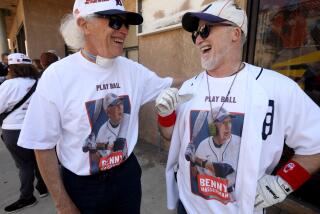Jack Lohrke dies at 85; major league infielder known for cheating death
Jack Lohrke, a major league infielder in the 1940s and ‘50s whose seeming ability to cheat death away from the baseball diamond earned him the nickname “Lucky,” has died. He was 85.
FOR THE RECORD:
Lohrke obituary: The obituary of major league baseball infielder Jack “Lucky” Lohrke in Friday’s Section A said he fought in the D-day invasion of Normandy as a member of the 35th Infantry Division. That division joined the Normandy campaign after D-day. —
Lohrke died Wednesday at a San Jose hospital two days after having a stroke at his home, said his son John.
Discovered as a teenager in the early 1940s on the semipro fields of Los Angeles, Lohrke spent seven seasons with the New York Giants and the Philadelphia Phillies after serving in World War II.
By the time he was 22, he appeared to have escaped death at least six times. When he debuted in the majors, in 1947, he was known as Lucky Lohrke.
Throughout his life, Lohrke insisted that his near-misses were no big deal, but history told another tale.
As a member of the 35th Infantry Division, he fought in the D-Day invasion of Normandy and the Battle of the Bulge. On four occasions, solders on both sides of him were killed in combat yet he emerged unscathed.
On his way home from the war in 1945, he was bumped from a military transport plane in Ohio to make room “for some big-shot,” Lohrke told The Times in 1990.
The plane crashed 45 minutes later, killing all on board.
In 1946, he was traveling with his minor-league teammates, the Spokane Indians, when he received orders during a restaurant stop to report immediately to the San Diego Padres, then a minor-league club.
Soon afterward, the bus careened off a cliff in the Cascade Mountains, killing nine of the 15 players aboard.
“When the bus took off . . . I bummed a ride back to Spokane,” Lohrke said in the 1990 interview. “When I got there I found out both of my roommates had been killed.”
Although he was accustomed to being lucky, Lohrke said, war had conditioned him to deal with disaster.
“Having been in combat, what’s going to shock you?” Lohrke said in 1990. “I’m a fatalist. I believe the old song, that whatever will be will be.”
From 1947 through 1951, he played for the Giants, first as a third baseman and then in a utility role. His lifetime batting average was .242. His best season was 1949 when he hit .267.
His career high of 11 home runs was reached as a Giant rookie. Two were memorable -- he hit the Giants’ 182nd home run of the season, which tied the Yankees’ record, then hit the 183rd.
He spent 1952 and 1953 with the Phillies and returned to the minors, eventually playing for the Hollywood Stars of the Pacific Coast League.
After retiring from baseball in 1958, Lohrke worked in security for the Lockheed Missile and Space Co. in Sunnyvale and other companies.
He had lived in San Jose since 1971.
Jack Wayne Lohrke was born Feb. 25, 1924, in Los Angeles, the second of three sons of John and Marguerite Lohrke. His father was employed by Fluor Corp.
By the time he graduated from South Gate High School in 1942, Lohrke was playing semi-pro baseball.
His first minor league team was the Padres, but he played only seven games for them before joining a minor-league team in Twin Falls, Idaho. He was named Twin Falls’ most valuable player during his first year and met his future wife, Marie, who was the sister of another player.
He was known to have an aversion to storytelling or boasting about his past. “My father didn’t want heroes in our family,” he told Sports Illustrated in 1994 for a story headlined: “O Lucky Man.”
In addition to Marie, whom he married in 1948, Lohrke is survived by six children, 10 grandchildren and seven great-grandchildren.
More to Read
Start your day right
Sign up for Essential California for the L.A. Times biggest news, features and recommendations in your inbox six days a week.
You may occasionally receive promotional content from the Los Angeles Times.






